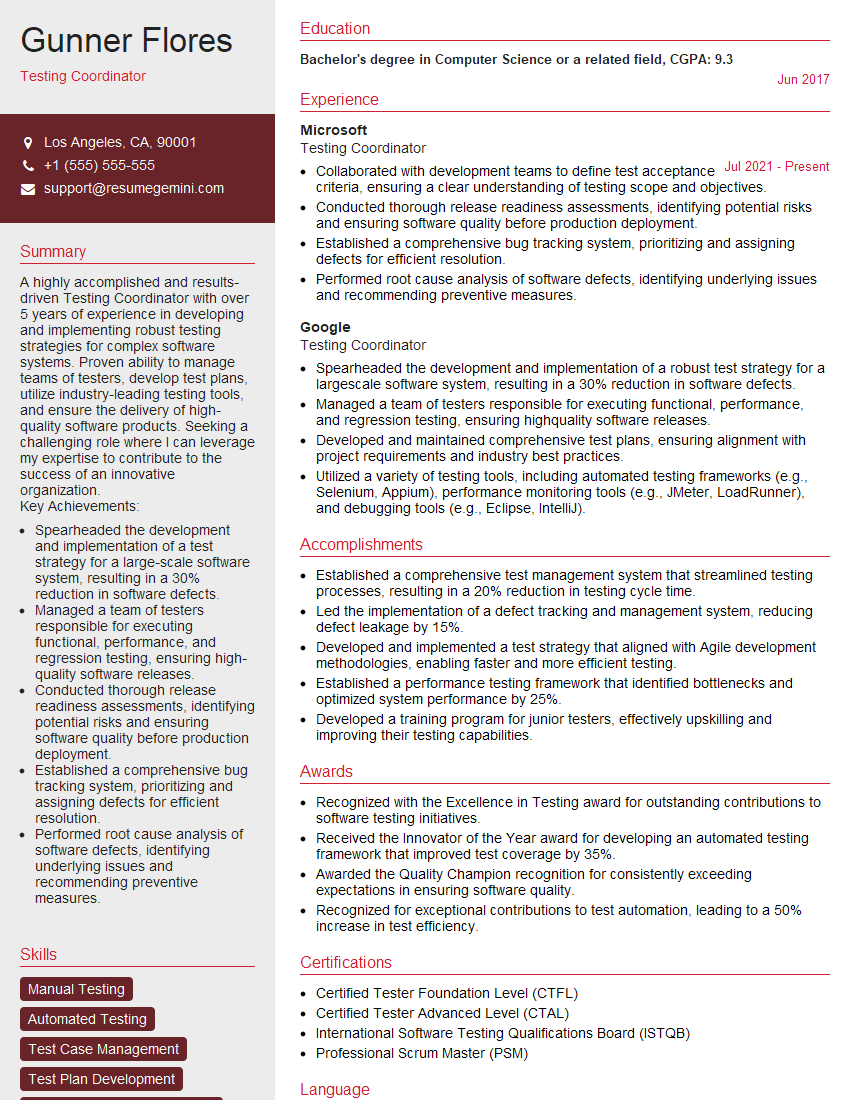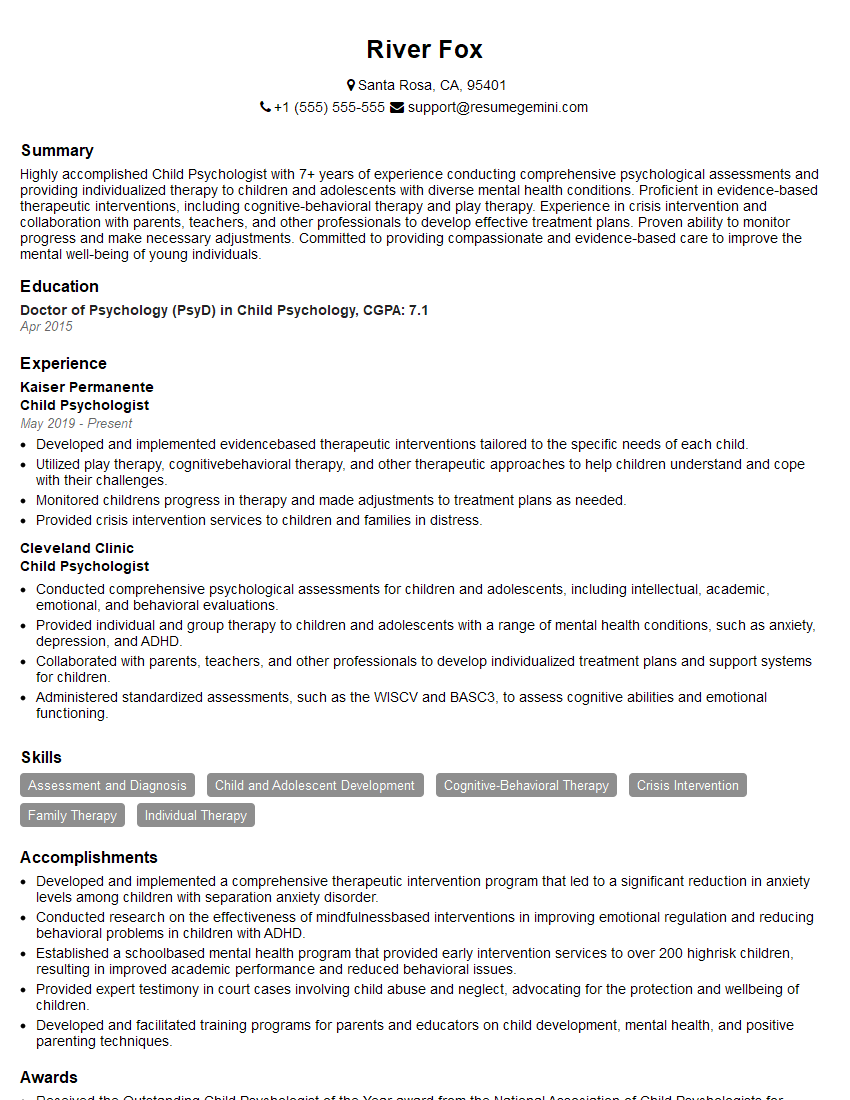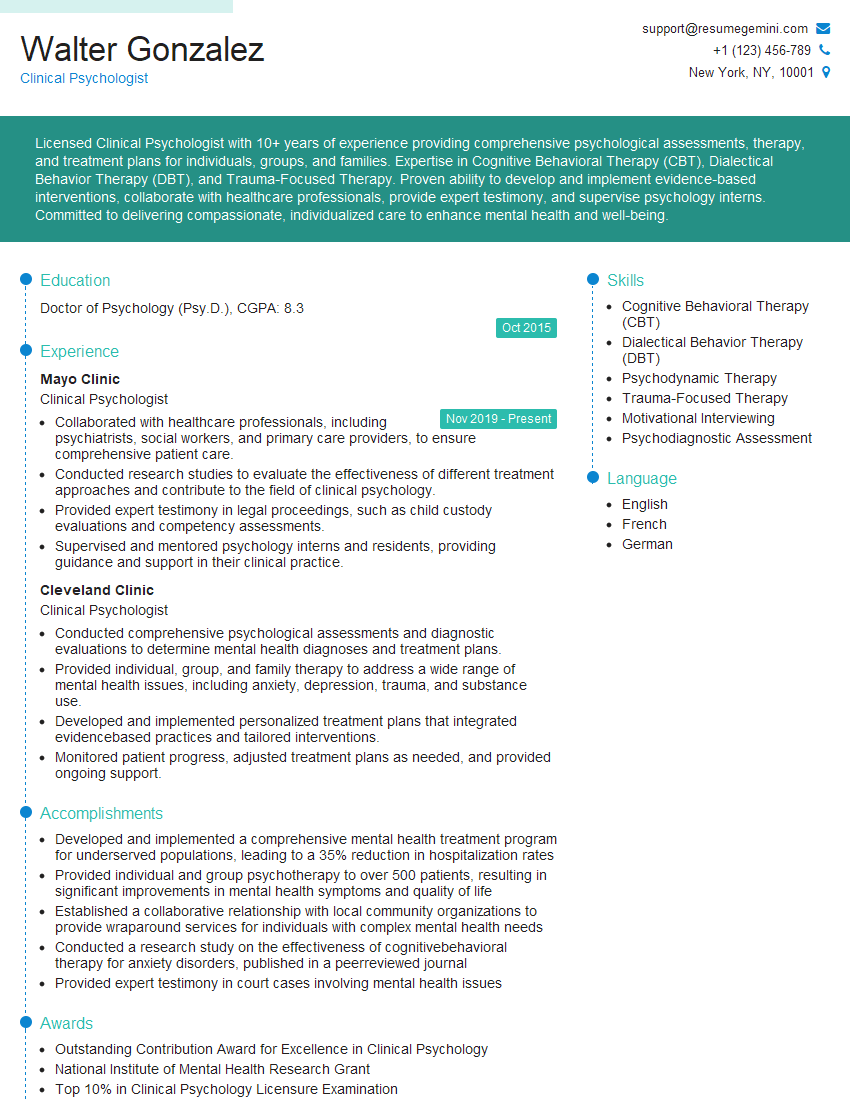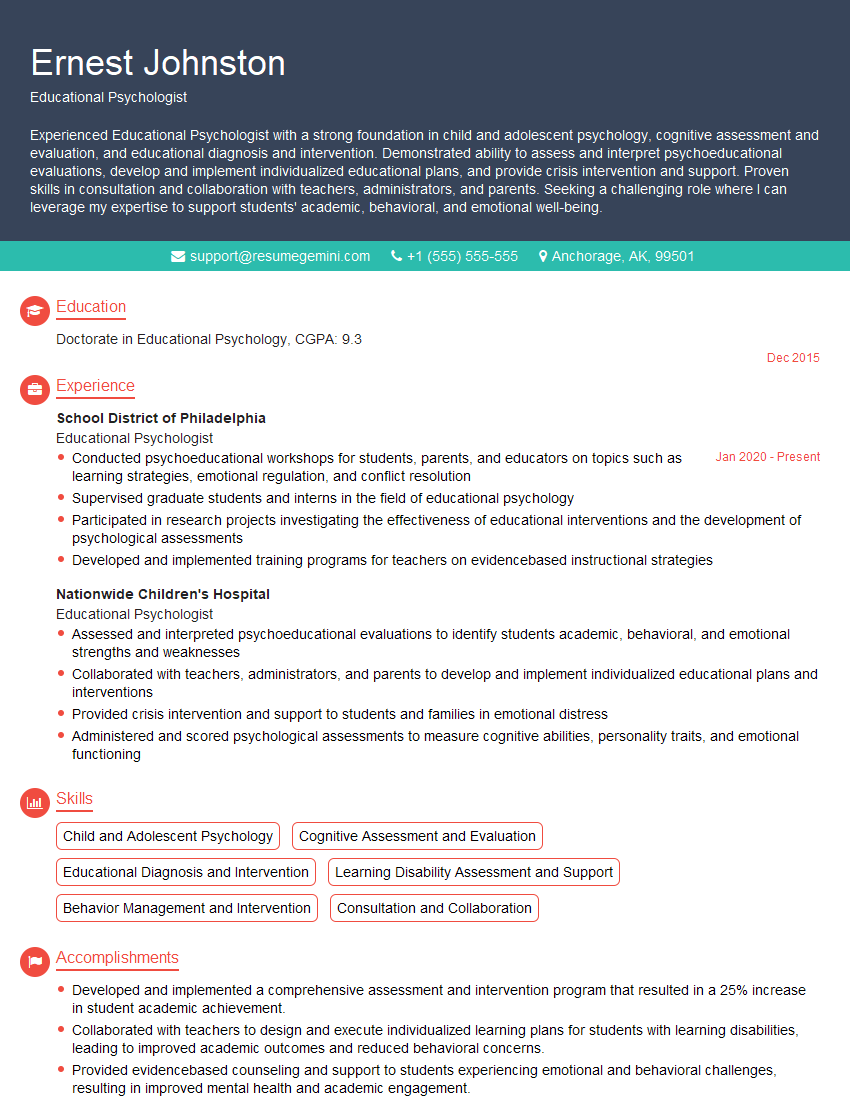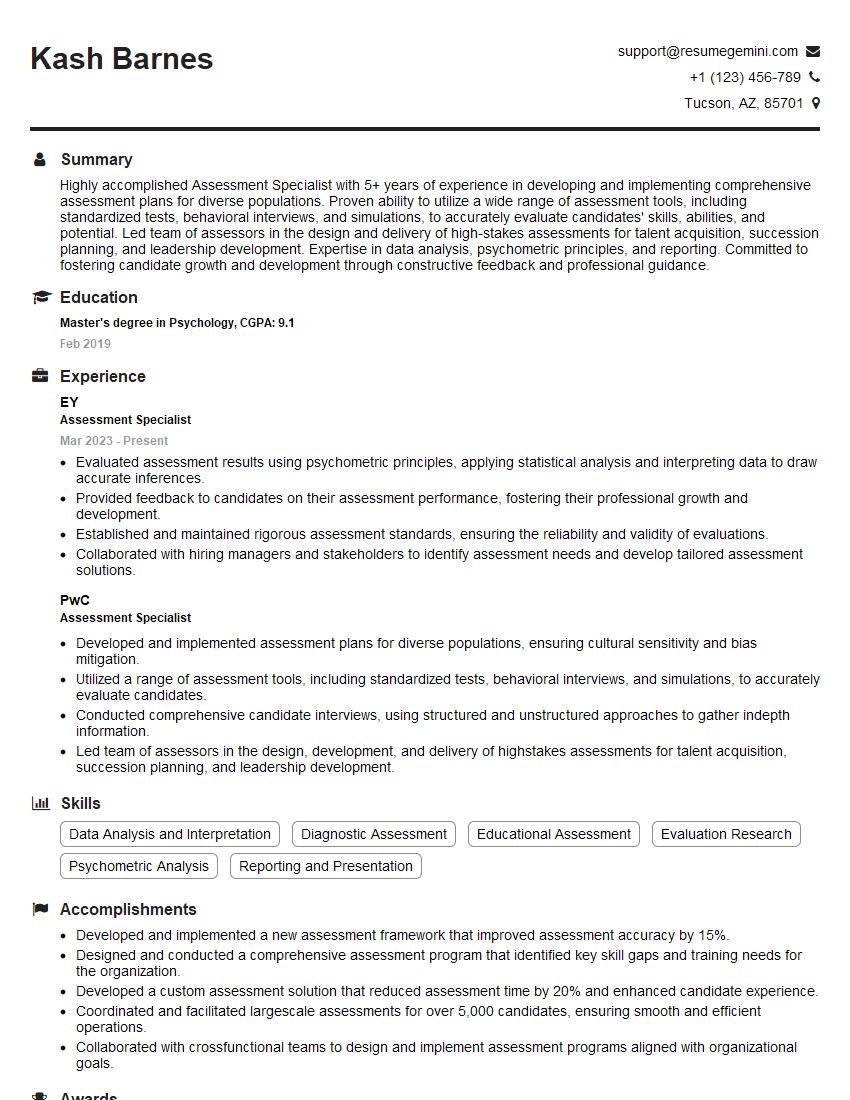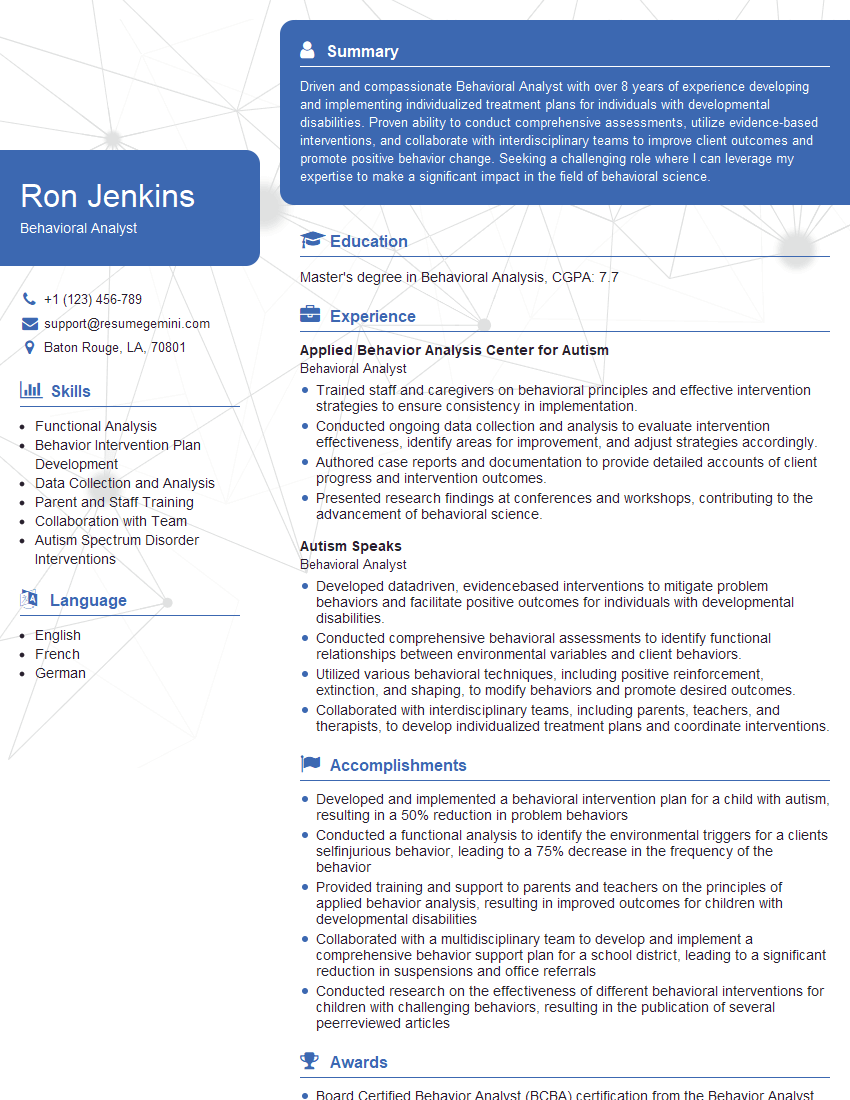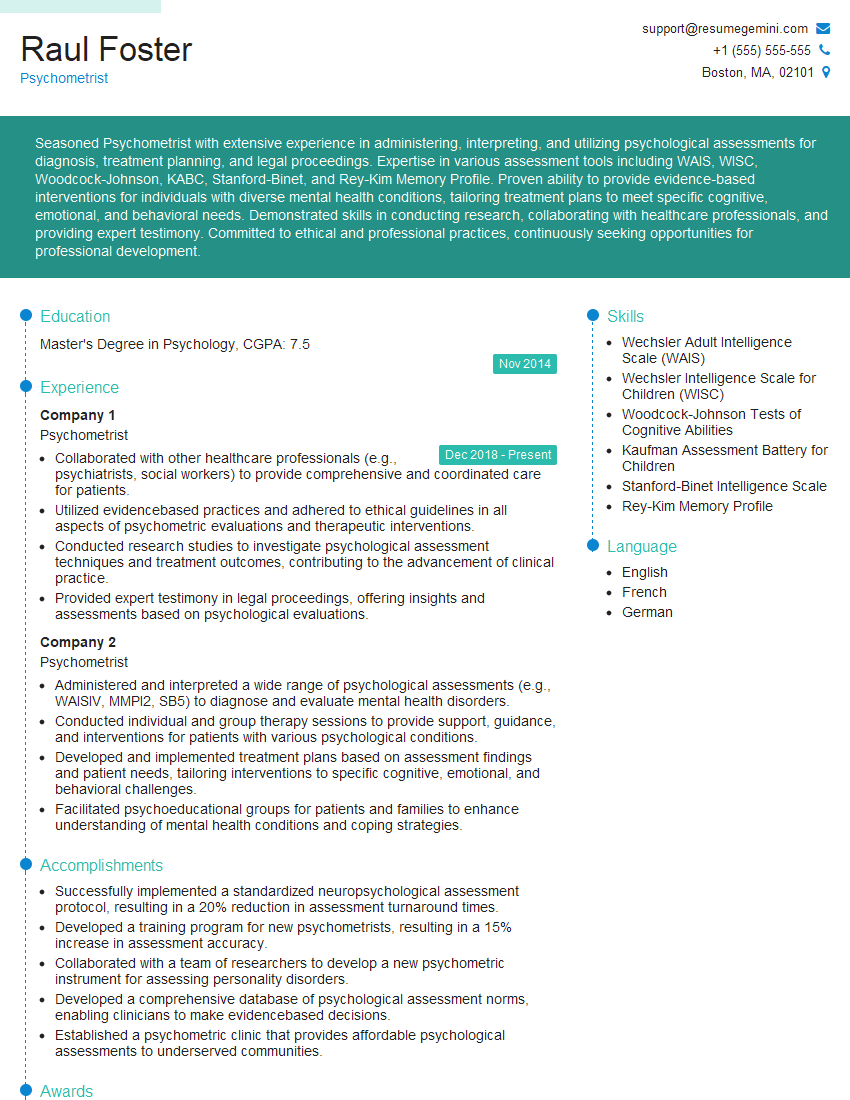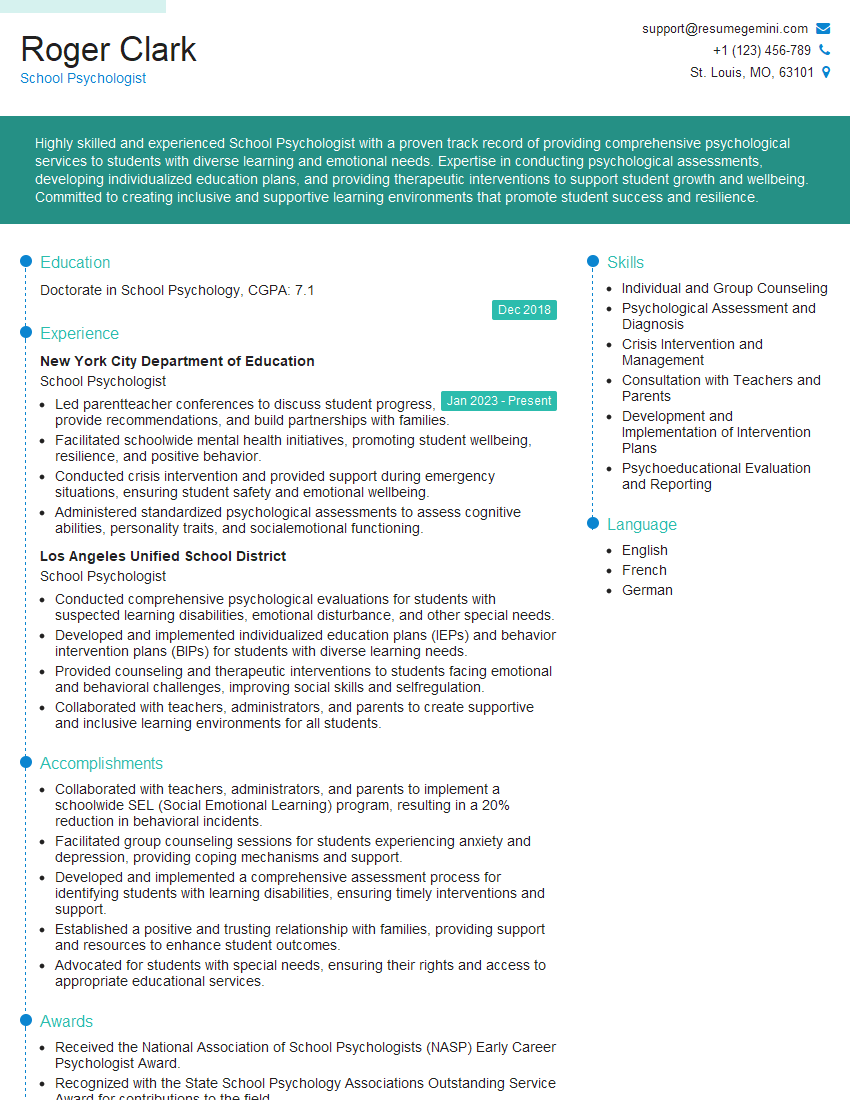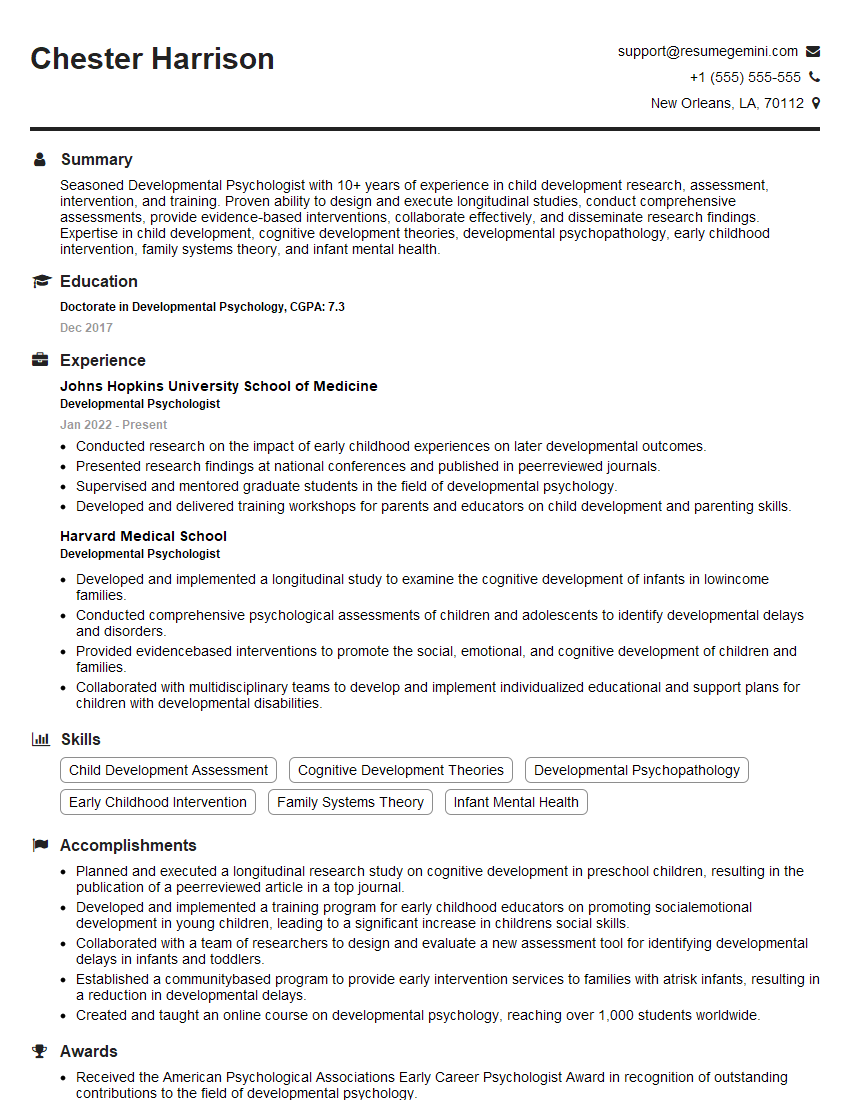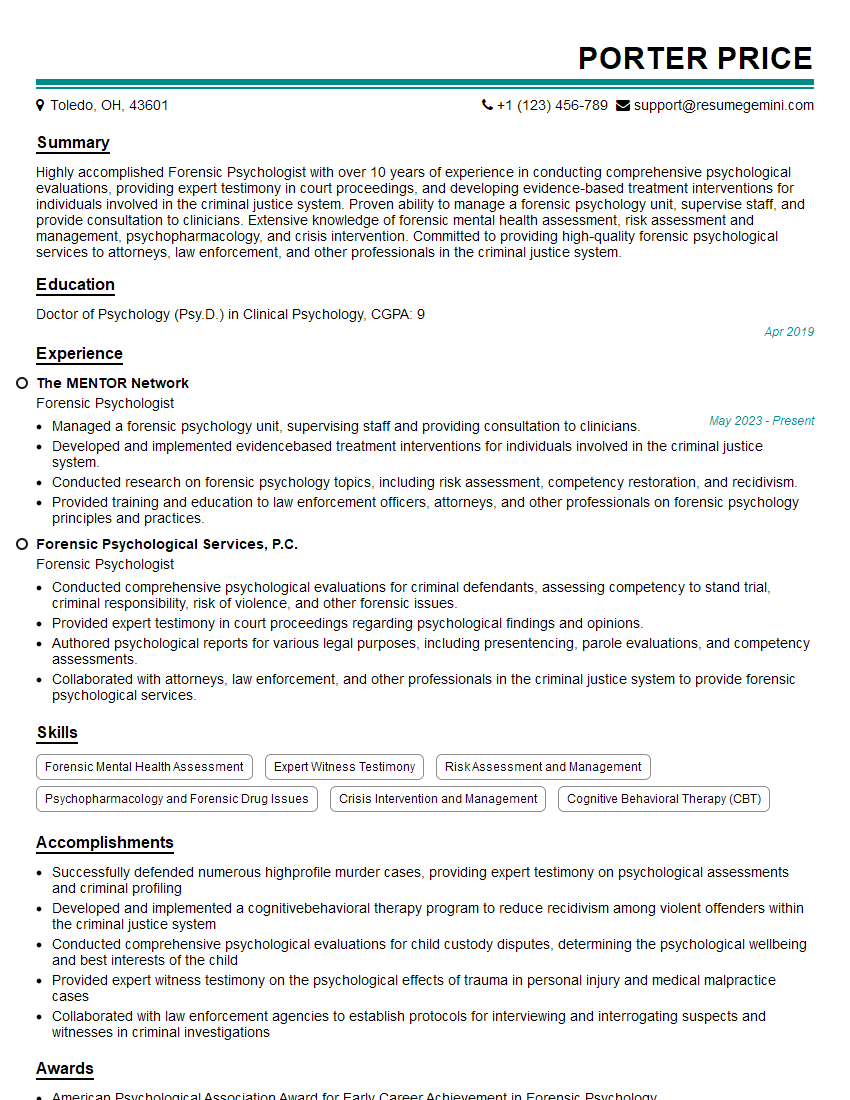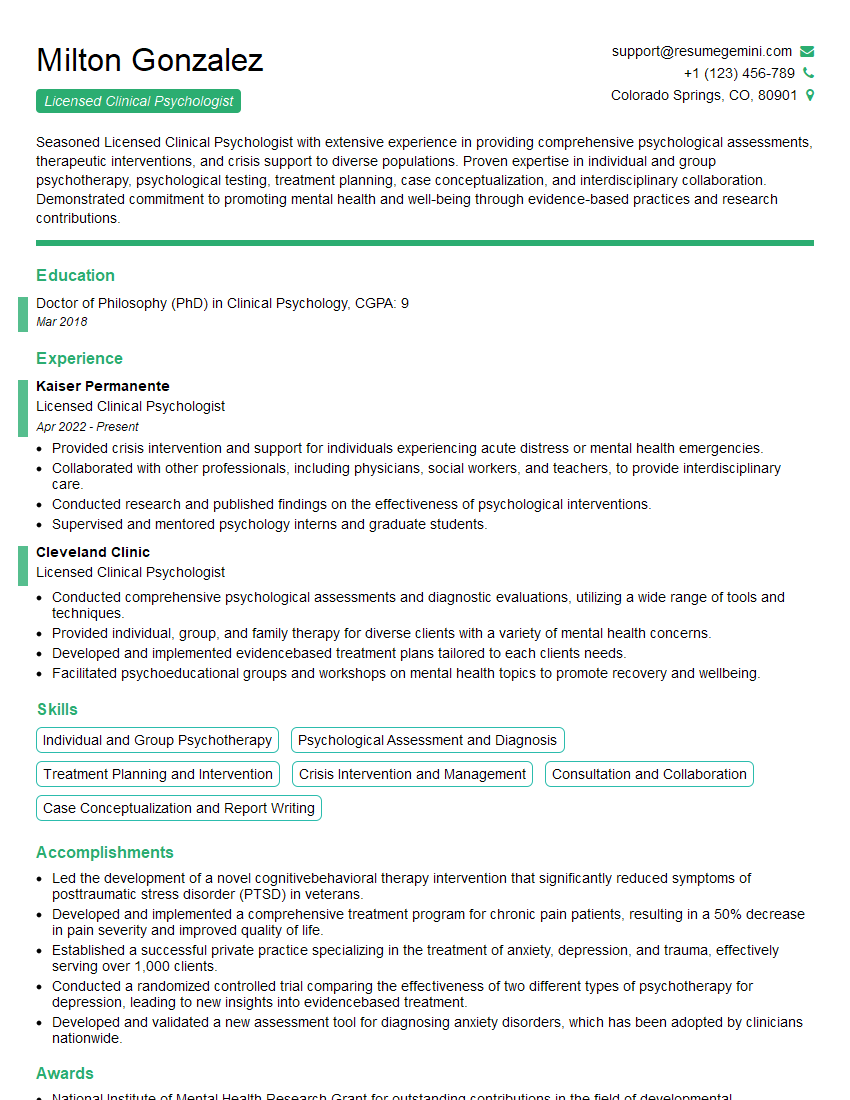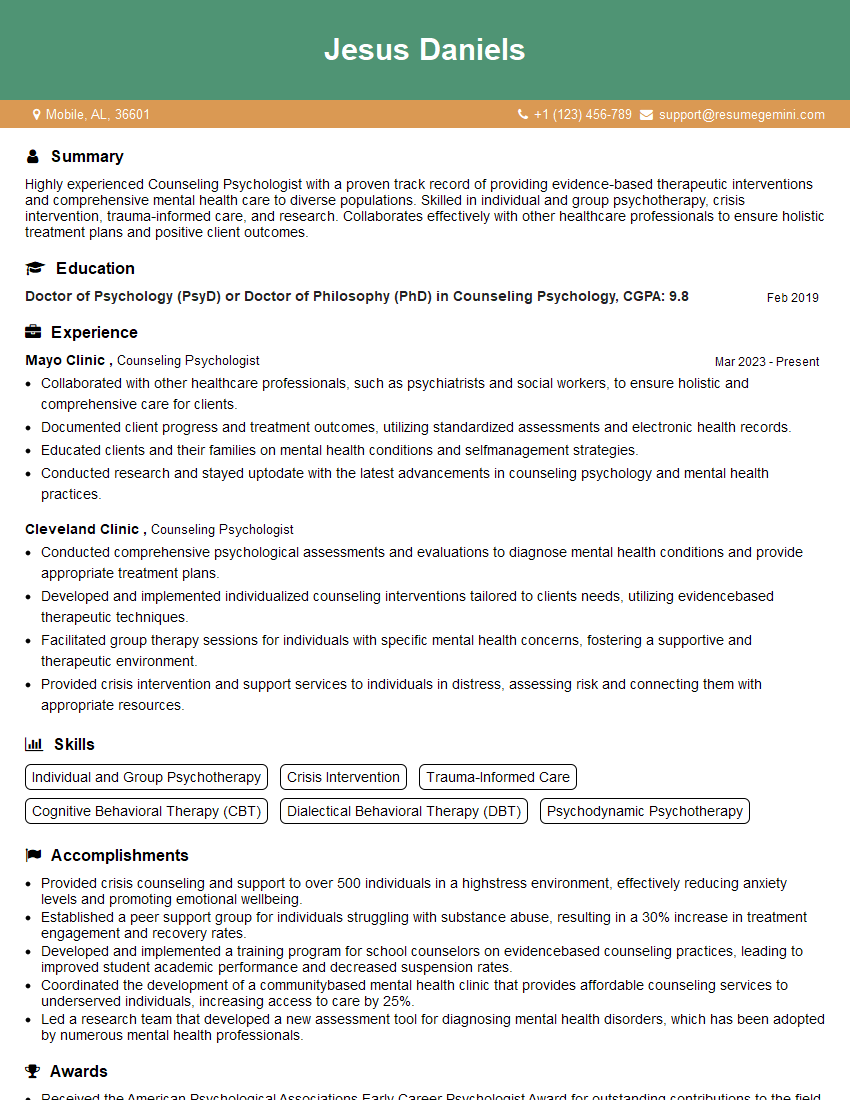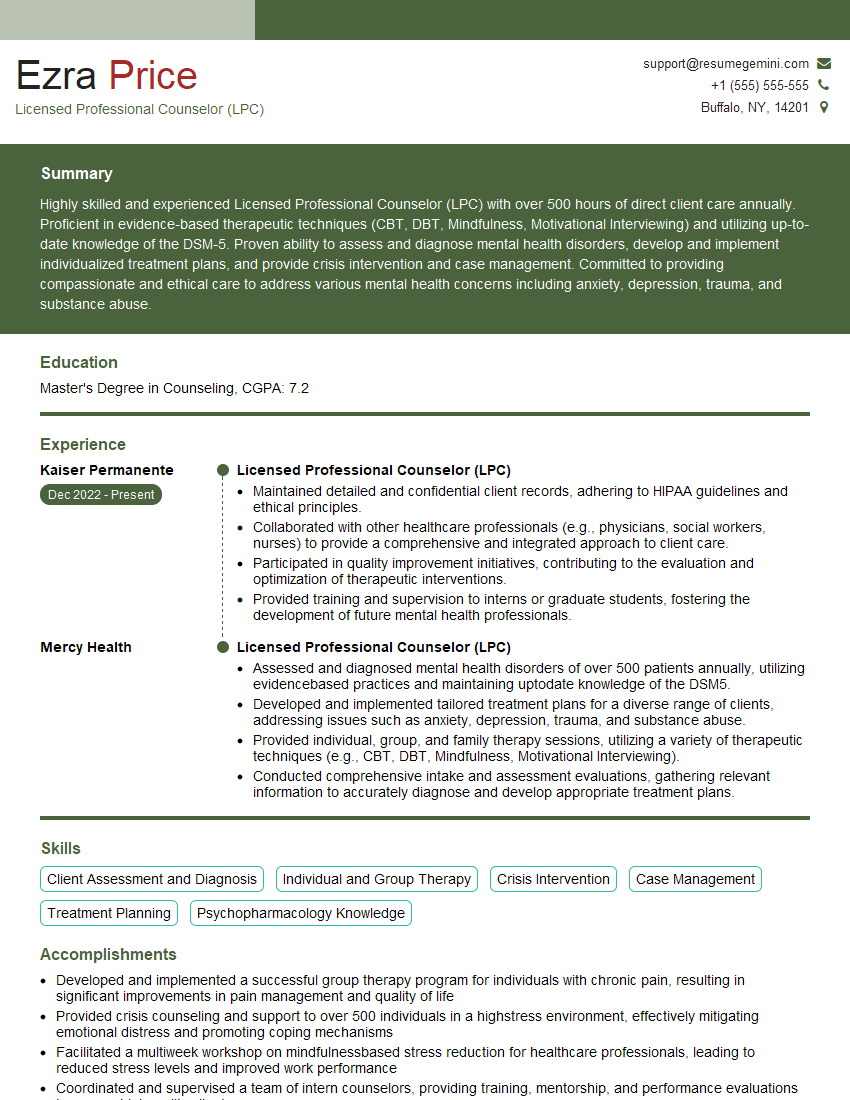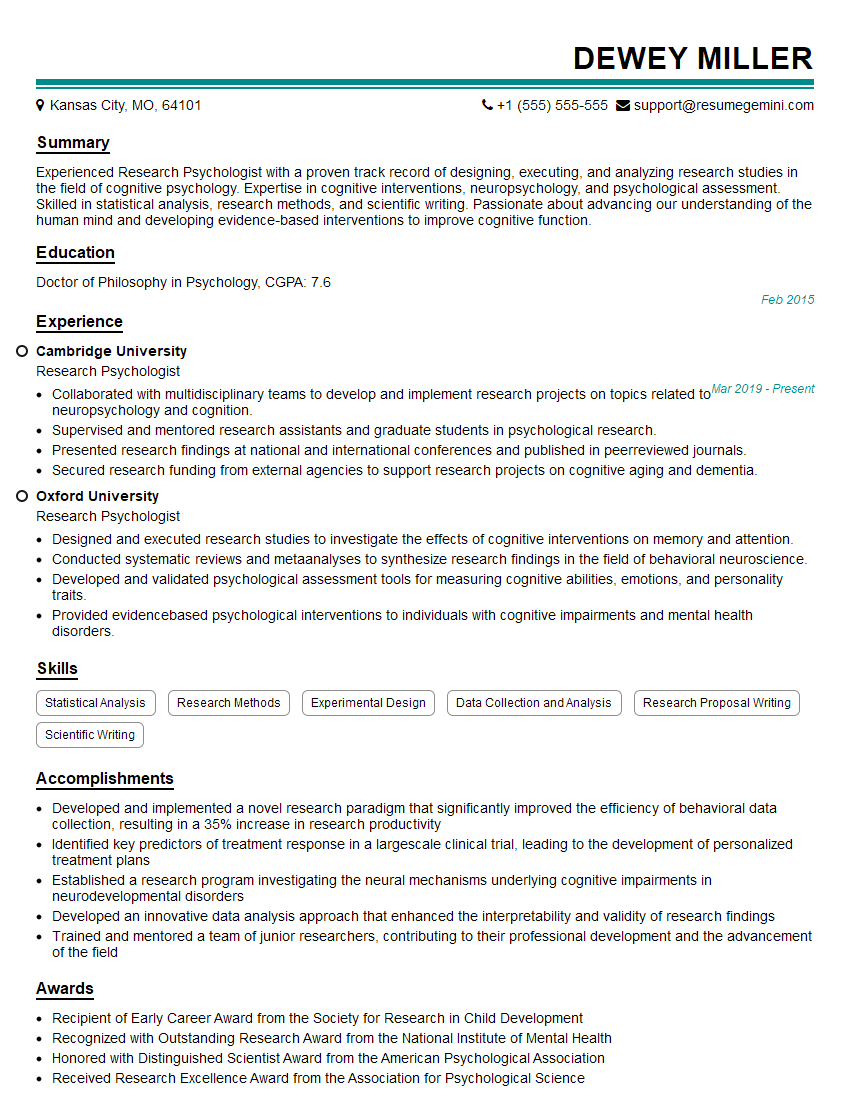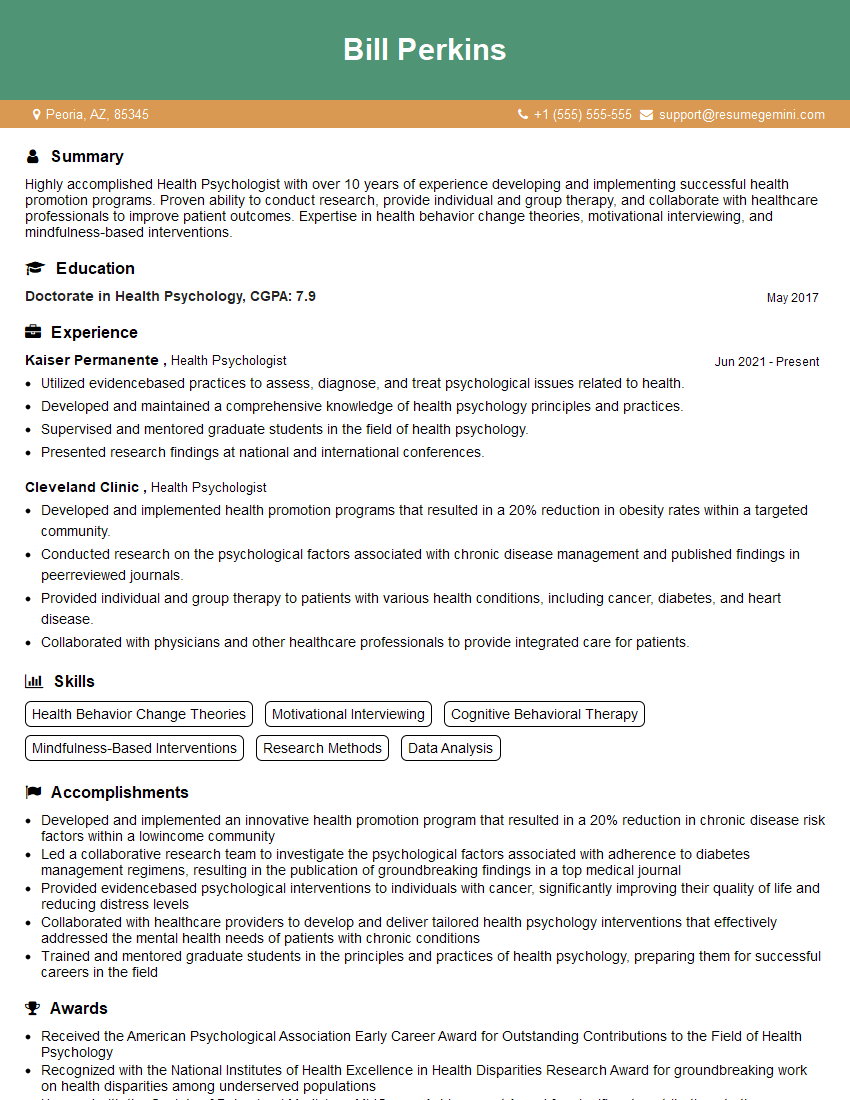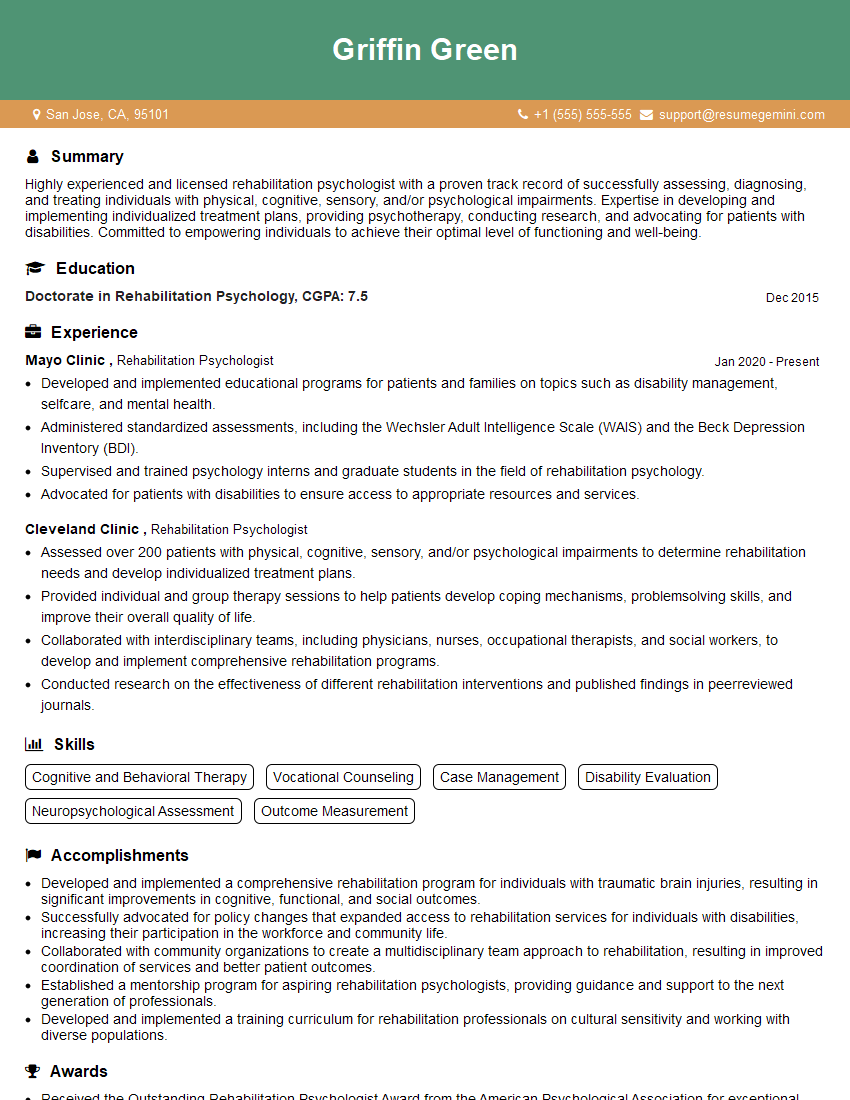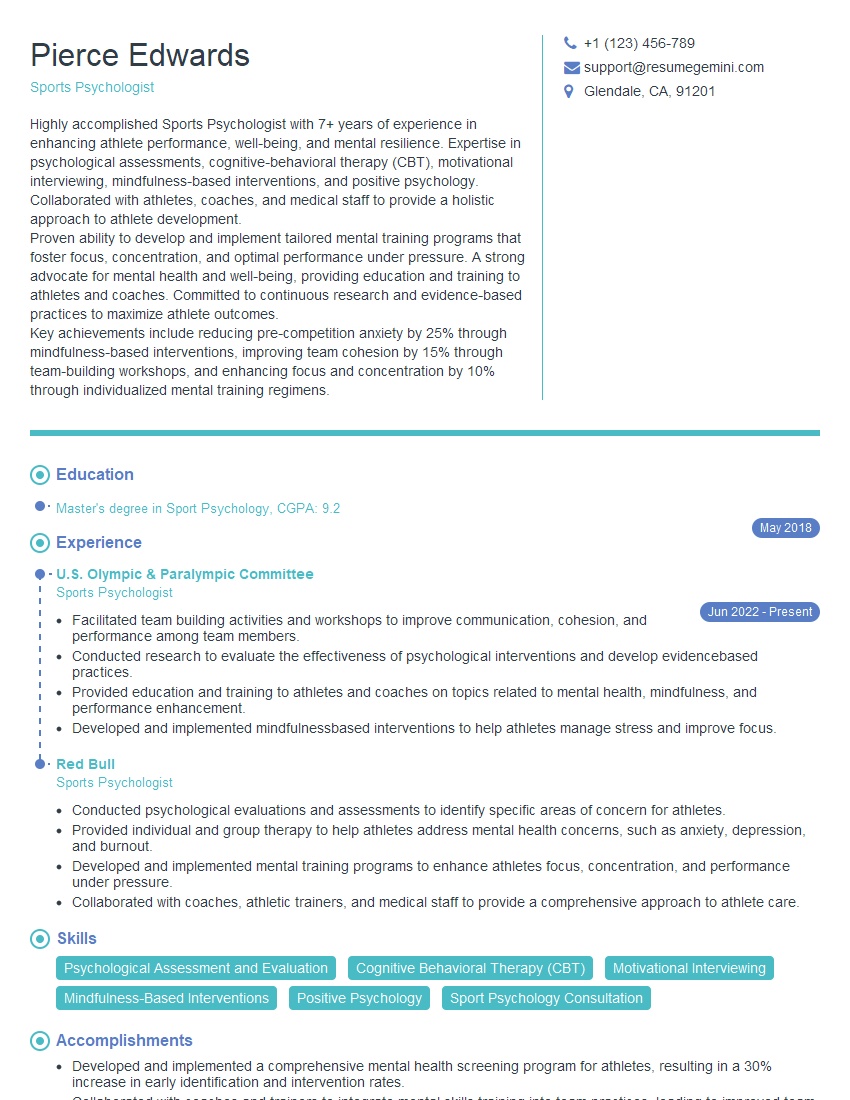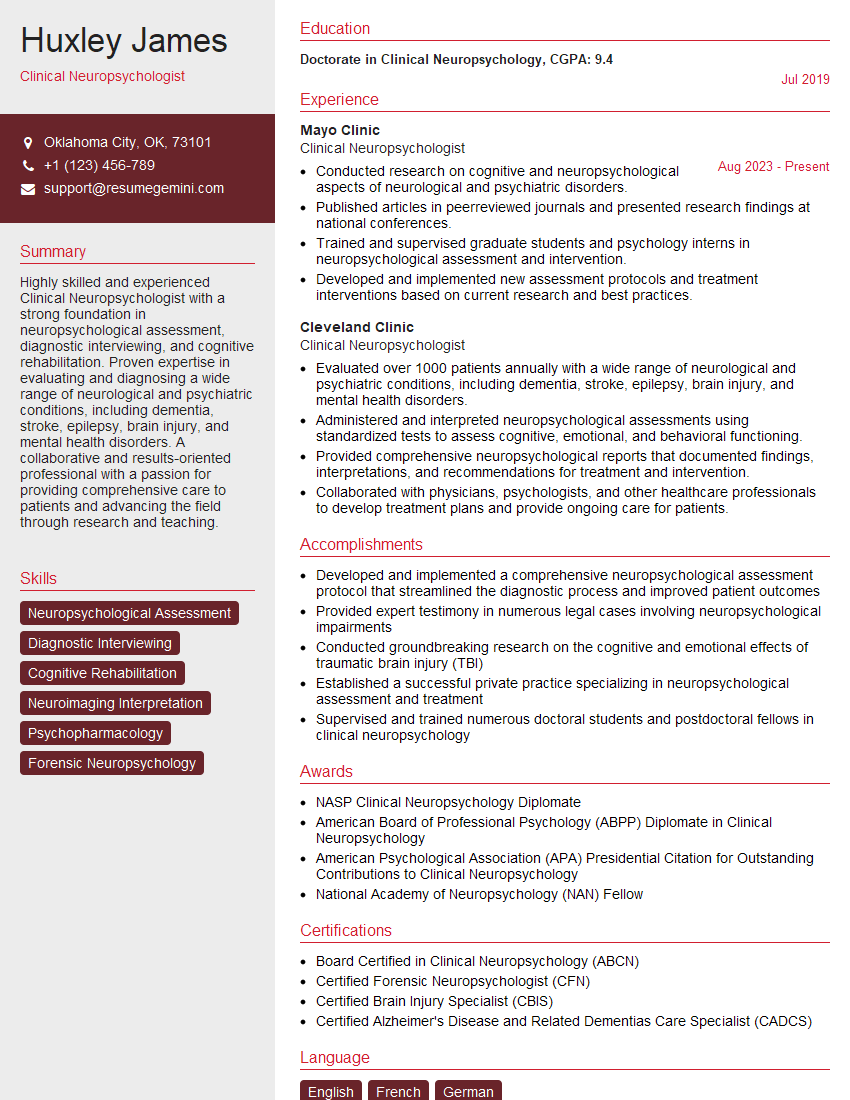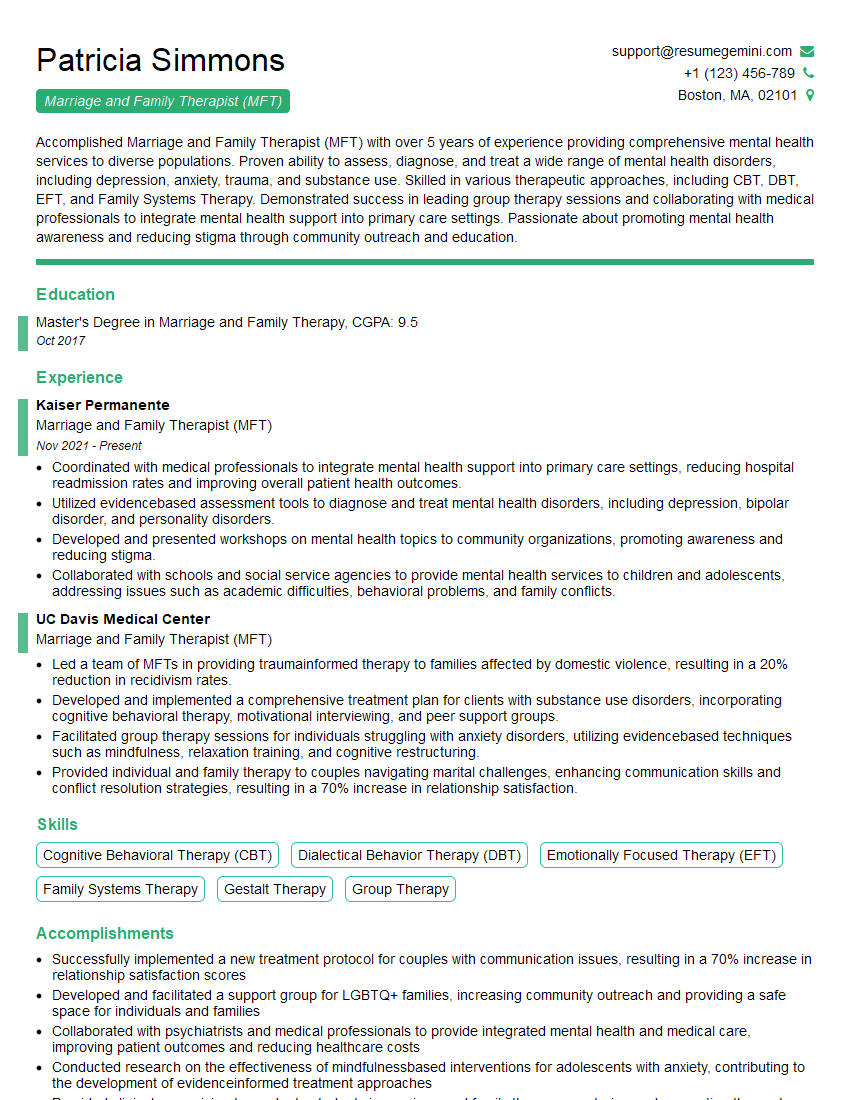Interviews are opportunities to demonstrate your expertise, and this guide is here to help you shine. Explore the essential Psychological Report Writing interview questions that employers frequently ask, paired with strategies for crafting responses that set you apart from the competition.
Questions Asked in Psychological Report Writing Interview
Q 1. Describe your experience in writing comprehensive psychological reports.
My experience in writing comprehensive psychological reports spans over [Number] years, encompassing a wide range of clinical settings including [List settings e.g., private practice, hospitals, schools]. I’ve authored hundreds of reports for diverse populations, from children and adolescents to adults, addressing various presenting concerns such as depression, anxiety, trauma, and learning disabilities. I’m proficient in generating reports tailored to various audiences – clinicians, educators, legal professionals, and even directly to clients depending on the context and their preference. My reports aim not only to present assessment findings but also to provide actionable recommendations and a nuanced understanding of the individual’s psychological functioning.
For example, in one case involving a child with ADHD, my report detailed not only diagnostic criteria and test results but also incorporated observational data from classroom visits and parent interviews to offer a holistic picture of the child’s behavior in various environments. This allowed for the development of tailored intervention strategies collaboratively with the school and family.
Q 2. How do you ensure the clarity and conciseness of your psychological reports?
Clarity and conciseness are paramount in psychological report writing. I achieve this through a structured approach. First, I outline the report logically, ensuring a clear progression from background information to assessment findings and recommendations. I utilize plain language, avoiding jargon unless absolutely necessary, and define any technical terms used. Each section focuses on a specific aspect of the evaluation, avoiding redundancy. Second, I rigorously edit and revise my reports, ensuring that the language is precise and that complex information is presented in a digestible format, often using tables and bullet points to highlight key findings. Third, I strive to use active voice and short, declarative sentences to enhance readability.
Imagine describing a client’s emotional lability. Instead of writing, ‘The client exhibited a degree of emotional variability,’ I would write, ‘The client’s mood fluctuated frequently.’ This subtle change enhances understanding and avoids unnecessary complexity.
Q 3. Explain your process for integrating assessment data into a psychological report.
Integrating assessment data into a psychological report is a multi-step process that begins with careful consideration of the referral question and the chosen assessment methods. First, I thoroughly review all data, including test scores, clinical interviews, collateral information, and observations. Second, I identify key themes and patterns across the different data sources. For example, if a client reports feelings of sadness and hopelessness in an interview, and this is supported by low scores on a depression scale and observations of withdrawn behavior, this strengthens the diagnostic picture. Third, I weave these data points into a narrative that tells a coherent story of the individual’s functioning. I avoid simply listing test results; instead, I interpret the findings in the context of the client’s life experiences and presenting problems. Finally, I ensure that all data is presented accurately and ethically, emphasizing the limitations of the assessment process.
For instance, if a personality test suggests possible narcissistic traits, I wouldn’t simply state this as fact. Instead, I would explore this in the context of their history, the limitations of the measure, and other information gathered.
Q 4. What are the key elements of a well-structured psychological report?
A well-structured psychological report typically includes several key elements: an identifying information section (name, date, referral source), a reason for referral, a detailed history (developmental, medical, social, etc.), a description of the assessment methods used, a presentation of findings, a diagnostic impression (if applicable), a summary, and recommendations. The order might vary depending on the context, but the key is that the information flows logically and comprehensively. The use of headings and subheadings enhances the report’s organization and readability, allowing the reader to quickly locate specific information.
- Identifying Information: Essential demographic details.
- Reason for Referral: The purpose of the evaluation.
- Background Information: Relevant developmental, social, and medical history.
- Assessment Methods: Tests administered and procedures used.
- Findings: Interpretation of the data.
- Diagnostic Impression: Formal diagnosis(es), if appropriate.
- Summary: A concise overview of the key findings and conclusions.
- Recommendations: Suggestions for treatment, intervention, or further evaluation.
Q 5. How do you maintain confidentiality and ethical considerations in report writing?
Confidentiality and ethical considerations are of utmost importance in report writing. I adhere strictly to all relevant ethical guidelines and legal requirements, including HIPAA regulations in the US and similar legislation in other jurisdictions. I use only clients’ initials or pseudonyms to protect their identity within reports and only share information with authorized recipients. Reports are stored securely, both electronically and physically. I carefully consider the language used to avoid any potentially stigmatizing or harmful phrasing, ensuring that the language is sensitive and respectful of the individual’s dignity and experience. Any limitations of the assessment are clearly stated to prevent misinterpretations. Informed consent is obtained from clients before conducting assessments and disseminating results.
For instance, I would avoid terms like “psychotic” without proper clinical justification and instead opt for more nuanced descriptions of the client’s experience.
Q 6. How do you handle conflicting data or ambiguous findings in your reports?
Handling conflicting data or ambiguous findings requires careful consideration and transparent reporting. I begin by reviewing all data meticulously, looking for patterns and contextual factors that might explain discrepancies. I explore alternative explanations for the findings. For example, if a client reports high levels of anxiety but scores low on a standardized anxiety measure, this might be due to response bias, a specific type of anxiety, or the limitations of the test itself. In the report, I explicitly acknowledge any inconsistencies and discuss possible explanations, emphasizing that it is essential to consider the entire clinical picture, not just individual test scores. I clearly express any limitations of the assessments and the resulting interpretations.
I might state something like: “While the client reports significant anxiety symptoms, the standardized anxiety measure yielded unexpectedly low scores. This discrepancy may be due to [possible reasons, e.g., response bias, specific anxiety presentation]. Further exploration is recommended.”
Q 7. Describe your experience using different assessment instruments and their relevance to report writing.
My experience encompasses a wide range of assessment instruments, including intelligence tests (e.g., Wechsler scales), personality inventories (e.g., MMPI-2-RF, PAI), projective techniques (e.g., Rorschach, TAT), and neuropsychological tests (e.g., Halstead-Reitan Battery). The choice of assessment is determined by the referral question and the client’s needs. For instance, if assessing for cognitive impairment, I would use neuropsychological tests; if assessing personality functioning, I might use a personality inventory or projective technique. My report writing reflects this diversity, integrating data from different instruments to build a comprehensive and nuanced picture. I am cautious to avoid over-interpreting findings from any single assessment tool and prioritize integrating data from multiple sources to support conclusions.
In a report, I wouldn’t simply state ‘The client scored in the average range on the WAIS-IV.’ Instead, I would integrate this with other findings, e.g., ‘The client scored in the average range on the WAIS-IV Full Scale IQ, consistent with his reported academic performance and self-report of cognitive abilities.’ This contextualization increases meaning and improves the report’s clarity.
Q 8. How do you tailor your report writing style to the intended audience (e.g., court, school, clinician)?
Tailoring psychological reports to the intended audience is crucial for effective communication and appropriate action. The language, level of detail, and emphasis on specific information vary greatly depending on whether the recipient is a court, a school, or a fellow clinician.
- Court: Reports for legal settings require precise, objective language, avoiding subjective interpretations or jargon. Emphasis is placed on observable behaviors, timelines, and diagnostic criteria adhering strictly to legal definitions. For example, a court report might focus on a defendant’s competency to stand trial, meticulously documenting the assessment process and findings related to their understanding of legal proceedings.
- School: Reports for schools need to be clear, concise, and focused on the student’s educational needs. Recommendations for accommodations, interventions, or specialized services are central, explaining their rationale in accessible terms for educators. A school report might detail a student’s attention deficits impacting their classroom performance and suggest strategies like preferential seating or shorter assignment lengths.
- Clinician: Reports for other clinicians emphasize comprehensive data, allowing for collaborative discussion and case conceptualization. More clinical jargon and sophisticated diagnostic discussions are acceptable, focusing on underlying psychological processes and treatment recommendations. A clinician’s report might include detailed information about a patient’s family history, defense mechanisms, and preferred therapeutic approaches.
Essentially, the writing style adapts to the reader’s knowledge base and the specific context of the report’s purpose.
Q 9. What strategies do you employ to ensure the accuracy and reliability of your reports?
Accuracy and reliability are paramount in psychological report writing. I employ several strategies to ensure these qualities:
- Rigorous Methodology: I meticulously document all assessment methods, including specific tests administered, scoring procedures, and observations made. This allows for transparency and scrutiny of my findings. This includes clearly stating the limitations of any assessment used.
- Appropriate Tests and Measures: I choose instruments based on their established psychometric properties (reliability and validity) and their appropriateness for the specific referral question and individual’s characteristics. Using a test unsuitable for the client is a major threat to reliability and validity.
- Data Triangulation: I integrate data from multiple sources, including interviews, observations, collateral information (from parents, teachers, etc.), and test results, to avoid relying on a single source that may be biased or incomplete. This approach provides a more holistic and nuanced understanding.
- Peer Review (when possible): When appropriate, I seek feedback from trusted colleagues on the clarity, accuracy, and completeness of my reports, particularly for complex cases. This is a crucial step in quality assurance.
- Regular Self-Reflection and Continuing Education: I regularly assess my own biases and limitations, and actively engage in continuing professional development to stay abreast of best practices and new research findings.
These steps work together to significantly reduce error and enhance the credibility of my reports.
Q 10. How do you manage time constraints when writing psychological reports?
Managing time constraints in report writing requires efficient planning and prioritization. I use these strategies:
- Detailed Case Notes: I maintain thorough, contemporaneous notes during the assessment process, avoiding the need for extensive recall later. This saves significant time when it comes to writing.
- Structured Report Templates: Using pre-formatted templates with headings for key sections (background, assessment methods, findings, diagnosis, recommendations) streamlines the writing process. This allows me to easily fill in the relevant information systematically.
- Time Blocking: I dedicate specific time blocks for report writing, minimizing interruptions and maximizing focus. Breaking down the task into smaller, manageable chunks can make it less overwhelming.
- Prioritization of Key Information: I focus on the essential information needed to address the referral question, avoiding unnecessary detail or digressions that extend the writing process unnecessarily.
- Prioritizing Urgent Cases: I establish a system for prioritizing cases based on urgency, ensuring that time-sensitive reports are completed promptly.
By implementing these time management techniques, I can produce high-quality reports within reasonable deadlines.
Q 11. Describe your experience with different software or tools for generating psychological reports.
I have extensive experience with various software and tools for generating psychological reports. These range from basic word-processing programs to specialized report-writing software.
- Word Processors (e.g., Microsoft Word, Google Docs): While seemingly basic, these programs remain widely used for their flexibility and accessibility. I frequently utilize templates and styles to maintain consistency and efficiency.
- Specialized Psychological Report Software: Some software packages offer features tailored to psychological assessment, including automated report generation, scoring integrations, and data management tools. While useful, they often involve a learning curve and may not cater to every assessment.
- Electronic Health Record (EHR) Systems: Many clinics and hospitals utilize EHRs that integrate reporting capabilities, often linking directly to assessment software for streamlined data transfer.
My software choice depends on the specific needs of the case, the available resources, and the client’s setting. Ultimately, proficiency across multiple platforms is advantageous.
Q 12. How do you stay current with best practices and guidelines in psychological report writing?
Staying current with best practices and guidelines in psychological report writing is a continuous process. I employ several strategies to ensure my knowledge remains up-to-date:
- Professional Journals and Publications: I regularly review peer-reviewed journals in clinical psychology and related fields to keep abreast of current research and best practices.
- Professional Organizations: Active membership in professional organizations (e.g., APA) provides access to continuing education opportunities, guidelines updates, and networking with colleagues.
- Conferences and Workshops: Attending professional conferences and workshops allows for direct interaction with leading experts in the field and exposure to the latest developments.
- Continuing Education Courses: I actively participate in continuing education courses focused on assessment, diagnosis, and report writing, particularly those accredited by relevant licensing boards.
- Supervision and Consultation: When faced with challenging cases or emerging ethical dilemmas, I seek supervision or consultation from experienced professionals to ensure I’m adhering to best practices.
Staying informed is not just about professional responsibility, but also about maintaining the highest standards of quality in my work.
Q 13. Explain your understanding of legal and ethical guidelines related to report writing.
Understanding legal and ethical guidelines is essential for responsible psychological report writing. This encompasses several key areas:
- Confidentiality: Maintaining client confidentiality is paramount, adhering strictly to HIPAA and other relevant regulations. Reports should only be released with informed consent, and sensitive information must be protected.
- Informed Consent: Clients must be fully informed about the purpose of the assessment, the potential uses of the report, and their rights before proceeding. This includes understanding the limitations of the assessment process.
- Competence: I only undertake assessments within my area of expertise, ensuring that my skills and training are appropriate for the task. Referring cases outside my area of competence is ethical and often legally required.
- Objectivity: Reports must be objective, avoiding personal biases or subjective interpretations that could influence the conclusions or recommendations.
- Accuracy and Truthfulness: Reports must be accurate, truthful, and free from fabrication or misrepresentation of data. This includes clearly stating the limitations of the findings.
- Legal Privileges: I am aware of the legal implications of privileged communication and how those limitations apply to the creation and release of reports.
Adherence to these guidelines protects both my clients and myself from legal repercussions and ensures ethical practice.
Q 14. How do you ensure your reports are free from bias and cultural sensitivity?
Ensuring reports are free from bias and culturally sensitive requires careful attention to several factors:
- Self-Awareness of Biases: I am acutely aware of my own potential biases and actively work to mitigate their influence on my assessment and report writing. This involves regular self-reflection and seeking feedback from others.
- Culturally Sensitive Assessment: I select assessment tools and methods that are appropriate for the client’s cultural background, considering factors like language proficiency, cultural values, and potential test bias. Using tests normed on populations significantly different from my client’s is problematic.
- Cultural Consultation: When necessary, I consult with experts in cultural psychology or seek input from community members to gain a deeper understanding of the client’s cultural context.
- Avoidance of Stereotyping: I meticulously avoid making generalizations or assumptions based on the client’s cultural background or other group affiliations.
- Language Access: I ensure access to interpreters or translated materials when working with clients who have limited proficiency in the language of the assessment.
- Consideration of Acculturation: I carefully consider the client’s level of acculturation and how this may impact their presentation and responses to assessment.
By taking these steps, I strive to produce reports that are fair, accurate, and respectful of the client’s cultural identity.
Q 15. Describe your experience in integrating qualitative and quantitative data in your reports.
Integrating qualitative and quantitative data is crucial for a comprehensive psychological report. Qualitative data, like interview transcripts or observational notes, provides rich contextual understanding of the client’s experiences and perspectives. Quantitative data, such as test scores or symptom ratings, offers objective measurements. Think of it like painting a picture: qualitative data provides the colors and brushstrokes, while quantitative data gives the structure and form.
For example, I might use qualitative data from a clinical interview to understand a client’s narrative around their anxiety, while quantitative data from a standardized anxiety inventory provides a numerical measure of its severity. I then weave these together in the report, showing how the quantitative data supports or refutes the qualitative findings, creating a more nuanced and complete picture.
In practice, I often use tables to present quantitative data concisely and then interpret this data within the context of the qualitative information. This helps to avoid presenting isolated numerical results and ensures that the findings are meaningful and relevant to the client’s lived experience.
Career Expert Tips:
- Ace those interviews! Prepare effectively by reviewing the Top 50 Most Common Interview Questions on ResumeGemini.
- Navigate your job search with confidence! Explore a wide range of Career Tips on ResumeGemini. Learn about common challenges and recommendations to overcome them.
- Craft the perfect resume! Master the Art of Resume Writing with ResumeGemini’s guide. Showcase your unique qualifications and achievements effectively.
- Don’t miss out on holiday savings! Build your dream resume with ResumeGemini’s ATS optimized templates.
Q 16. How do you deal with requests for clarification or additional information about your reports?
Requests for clarification are vital for ensuring the accuracy and utility of my reports. I approach these requests professionally and promptly. My response typically involves reviewing the specific section in question, ensuring I understand the source of the confusion. I then formulate a response that is clear, concise, and avoids technical jargon where possible.
Sometimes, this might involve providing additional context or examples. For instance, if a reader doesn’t understand a specific test score, I might explain the test’s purpose and interpret the score within the client’s overall profile. If the request is beyond a simple clarification and requires further investigation or testing, I clearly communicate that to the requesting party, outlining the necessary steps and associated timelines.
I always document all clarifications and additional information provided to ensure a complete record and maintain consistency.
Q 17. How do you ensure the reports are easily understood by non-psychologists?
Making complex psychological information accessible to a non-psychological audience is paramount. I achieve this through several strategies. First, I avoid technical jargon whenever possible, replacing it with plain language explanations. Second, I use clear and concise language, structuring sentences and paragraphs for optimal readability. I break down complex concepts into smaller, manageable chunks, using analogies and examples to illustrate points.
For example, instead of saying “The client exhibits significant elevations on the MMPI-2 scale for psychopathy,” I might say, “The client’s test results suggest a pattern consistent with certain personality traits often associated with impulsivity and disregard for others.” Finally, I always emphasize the practical implications of my findings, focusing on how they relate to the client’s goals and concerns.
Visual aids, such as charts and graphs, can also improve comprehension for non-psychologists. I utilize these whenever appropriate, ensuring they are clear, well-labeled, and easy to interpret.
Q 18. What are the common challenges you face in psychological report writing, and how do you overcome them?
Challenges in psychological report writing are common, but manageable. One significant hurdle is balancing conciseness with comprehensiveness. It’s a delicate balance – providing sufficient detail without overwhelming the reader with irrelevant information. Another challenge is maintaining objectivity while conveying empathy and understanding for the client. We must present data accurately, but also humanize our findings.
Another difficulty lies in managing the time constraints imposed on report writing. Producing a high-quality report requires thorough analysis and careful consideration, and time pressures can sometimes necessitate efficient prioritization and delegation of tasks (if appropriate within the organizational structure).
I overcome these challenges by using standardized templates and outlines that ensure consistency and efficiency. Careful planning of the writing process, including outlining and drafting sections sequentially, helps to organize thoughts and produce a more coherent report. Peer review and regular self-reflection helps ensure clarity and quality, enabling continual process improvement.
Q 19. How do you incorporate client feedback in the report writing process?
Client feedback is invaluable in enhancing report quality. While I don’t directly involve clients in the writing process itself (to maintain the integrity of professional interpretation), I do ensure they have opportunities to provide feedback on the final report. This might involve a post-report meeting to discuss the findings and ensure accuracy and clarity.
For example, I’d ask the client if the report accurately reflects their understanding of their situation, and if there’s anything they feel needs clarification. This approach demonstrates respect and collaboration, allowing the client to participate in the understanding of their assessment results.
While I maintain professional objectivity, client feedback helps ensure the report is meaningful and relevant to the client’s experience and is understood and appreciated. Importantly, client feedback is confidential and used only to improve future reports. Any changes prompted by client feedback are made in consultation with supervisory professionals to maintain the integrity of the psychological evaluation.
Q 20. Describe your process for reviewing and editing your psychological reports.
My review and editing process is a multi-stage approach. First, I conduct a thorough self-review, checking for accuracy, clarity, and consistency. This includes verifying the accuracy of all data presented and ensuring the logical flow of information. Then, I take a break from the report before reviewing it again with fresh eyes – this often helps me spot errors I previously missed.
Second, I use editing software tools for grammar and style checks. Finally, and critically, I utilize peer review. A colleague with experience in psychological report writing reviews my work, providing feedback on clarity, organization, and the overall impact. This ensures an objective assessment of my work and facilitates continuous professional development.
This multi-layered approach guarantees a high-quality, error-free report that effectively communicates complex information. Documentation of all revisions and feedback is maintained.
Q 21. How do you ensure the appropriate use of terminology and jargon in your reports?
Appropriate use of terminology is essential for maintaining professional standards and ensuring clarity. I carefully select terms, defining any specialized jargon that might be unfamiliar to the intended audience. I strive for a balance – using precise technical terms when necessary, but avoiding unnecessary jargon that might obscure meaning for the reader. My goal is always to convey information accurately and accessibly.
For example, instead of relying solely on clinical diagnostic terms, I might explain the practical implications of a diagnosis in everyday language. I also ensure that any specialized terms used are clearly defined within the report context, enhancing the report’s accessibility. Consistent and accurate terminology use is integral to the report’s credibility and its effectiveness in communicating assessment findings.
Regular updates on diagnostic criteria and evolving terminology within the field are ensured through professional development and staying current with published literature and clinical guidelines.
Q 22. Explain your understanding of the different types of psychological reports (e.g., diagnostic, forensic, neuropsychological).
Psychological reports vary significantly depending on their purpose. Three major types are diagnostic, forensic, and neuropsychological reports. A diagnostic report summarizes a client’s presenting problem, relevant history, assessment findings (e.g., from interviews, tests, observations), and a diagnosis according to a standardized classification system like the DSM-5 or ICD-11. It focuses on understanding the individual’s mental health status. For example, a diagnostic report for a child struggling with school might detail their academic performance, social interactions, and emotional regulation, leading to a diagnosis such as Attention-Deficit/Hyperactivity Disorder (ADHD).
A forensic report is prepared for legal contexts, such as child custody evaluations, competency to stand trial, or personal injury cases. These reports adhere to strict legal standards, emphasizing objectivity and transparency. They may involve detailed analysis of an individual’s psychological functioning as it relates to legal questions. For instance, a forensic report might evaluate a defendant’s capacity to understand the charges against them.
Neuropsychological reports focus on the relationship between brain function and behavior. These reports extensively evaluate cognitive abilities like memory, attention, and executive functions, often following a brain injury or suspected neurological condition. They might include detailed descriptions of test performance, interpretation of findings in the context of the individual’s history, and recommendations for rehabilitation or treatment. An example would be a report assessing cognitive impairments after a stroke.
Q 23. What is your experience in writing reports for diverse populations?
My experience encompasses working with diverse populations, including children, adolescents, adults, and older adults, across various cultural backgrounds and socioeconomic statuses. I adapt my approach to each individual by considering their unique cultural values, communication styles, and life experiences. For example, when working with a client from a collectivist culture, I might place more emphasis on the family dynamics and social context compared to working with someone from an individualistic culture. I’m also proficient in using culturally sensitive assessment measures and interpreting results considering potential cultural biases. I use plain language and avoid jargon to ensure clear communication and build trust. When language barriers exist, I collaborate with interpreters and ensure the assessment process respects their cultural background and communication preferences. This inclusive approach ensures accurate assessments and effective interventions.
Q 24. How do you prioritize information when writing a comprehensive report?
Prioritizing information in a psychological report requires a structured approach. I start by identifying the key referral questions and the purpose of the evaluation. Information directly addressing these questions receives top priority. Next, I integrate findings from the most reliable and valid assessment methods. For example, results from standardized tests often hold more weight than subjective observations. I then organize the report logically, typically moving from background information to assessment findings, interpretation, and recommendations. Clinically significant findings, particularly those related to risk or safety, are highlighted prominently. I use clear and concise language, avoiding unnecessary technical jargon. Finally, I always maintain a balance between comprehensiveness and brevity, aiming to provide sufficient detail while remaining focused on the core issues. Think of it like building a house; the foundation (referral question and purpose) is laid first, followed by strong supporting structures (reliable data), and concluding with a functional and aesthetically pleasing design (clear and concise writing).
Q 25. What software proficiency do you possess for report generation and data analysis?
I am proficient in several software programs used for report generation and data analysis. My skills include using statistical software packages such as SPSS and R for analyzing quantitative data. I’m also experienced with various word processing programs, including Microsoft Word and Google Docs, which are crucial for writing and formatting reports. Moreover, I utilize electronic health record (EHR) systems for storing and managing patient data securely. This allows for streamlined data entry and easy access to pertinent information while maintaining confidentiality. I also have experience with specialized psychological assessment software that automates scoring, interpretation, and report generation for certain tests, enhancing efficiency and accuracy.
Q 26. Describe a situation where you had to modify your report writing approach based on new information.
In one case, I was writing a report on a child suspected of having ADHD. My initial assessment suggested inattentiveness as the primary symptom. However, during a follow-up meeting with the parents, they revealed the child had recently experienced a significant family disruption, resulting in increased stress and emotional distress which manifested as behavioral issues that mimicked symptoms of ADHD. This new information significantly altered my interpretation of the initial findings. I revised my report to incorporate the family dynamics and stress, adjusting my diagnosis to consider both ADHD and the impact of trauma. The original report focused solely on the ADHD symptoms, which was an incomplete picture. The final report included a more comprehensive understanding of the child’s difficulties, leading to a more nuanced and effective treatment plan.
Q 27. How do you manage multiple report writing deadlines simultaneously?
Managing multiple report-writing deadlines effectively requires a strong organizational system and time-management skills. I employ several strategies, including creating a detailed project timeline for each report, prioritizing tasks based on urgency and importance, and breaking down larger tasks into smaller, manageable steps. I use project management tools like calendars and task lists to schedule my work and track progress. I allocate specific time blocks for writing, data analysis, and review. Moreover, I regularly review my schedule to ensure I’m on track and adapt as needed. If unexpected delays arise, I proactively communicate with stakeholders and adjust timelines accordingly. Maintaining a clear and organized workspace helps minimize distractions and enhance efficiency. This organized approach helps me avoid feeling overwhelmed and deliver high-quality reports on time.
Key Topics to Learn for Psychological Report Writing Interview
- Ethical Considerations in Report Writing: Understanding confidentiality, informed consent, and appropriate language for diverse audiences. Practical application: Analyzing case studies to identify potential ethical dilemmas and developing solutions.
- Diagnostic Formulation & Assessment: Mastering the accurate and nuanced description of psychological diagnoses based on assessment data. Practical application: Practicing the integration of multiple assessment measures (e.g., interviews, tests) into a coherent diagnostic summary.
- Report Structure & Organization: Developing clear, concise, and logically organized reports that effectively communicate findings to intended recipients (e.g., clinicians, courts, schools). Practical application: Creating outlines and templates for different types of reports.
- Data Interpretation & Synthesis: Effectively interpreting quantitative and qualitative data to draw meaningful conclusions and support recommendations. Practical application: Developing skills in critical thinking and analytical reasoning to identify patterns and trends within complex datasets.
- Recommendation Development & Treatment Planning: Formulating evidence-based recommendations and treatment plans tailored to the individual’s needs and context. Practical application: Developing realistic and achievable goals for clients based on assessed strengths and weaknesses.
- Writing Style & Clarity: Utilizing precise and objective language, avoiding jargon, and ensuring readability for the intended audience. Practical application: Practicing writing clear and concise summaries of complex information.
- Legal & Forensic Aspects (if applicable): Understanding legal requirements and standards for report writing in forensic contexts. Practical application: Familiarizing oneself with relevant legal guidelines and case law.
Next Steps
Mastering psychological report writing is crucial for career advancement in various settings, from clinical practice to forensic psychology and research. A strong command of this skill demonstrates professionalism, attention to detail, and a commitment to ethical practice. To enhance your job prospects, create an ATS-friendly resume that showcases your expertise. ResumeGemini is a trusted resource that can help you build a professional and impactful resume tailored to the specific demands of the Psychological Report Writing field. Examples of resumes specifically designed for this area are available to guide you.
Explore more articles
Users Rating of Our Blogs
Share Your Experience
We value your feedback! Please rate our content and share your thoughts (optional).
What Readers Say About Our Blog
This was kind of a unique content I found around the specialized skills. Very helpful questions and good detailed answers.
Very Helpful blog, thank you Interviewgemini team.
